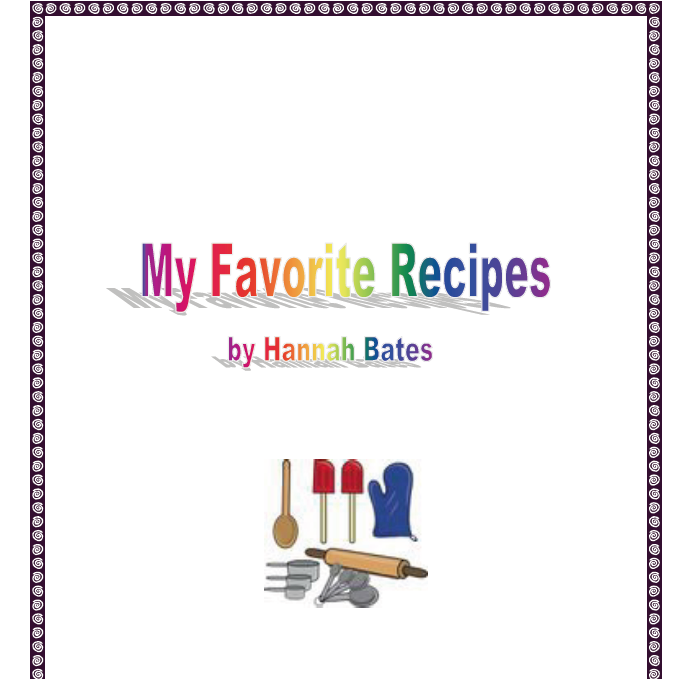Mini Reports: We even do cookbooks!
By Christine Gable
Today’s blog is from one of our fabulous staff instructors: Christine Gable.
She’s the mastermind behind the Mini Reports class, where your kids learn to apply Brave Writer writing strategies to writing across the curriculum, or to their hobbies and interests. If you are looking for hand-holding and a tutorial feel for individual writing projects you want your kids to execute, Mini Reports is the way to go!
Sign up now as class starts MONDAY!
There’s nothing like a new journal. All those fresh smooth pages, that crisp paper. All the possibilities, the latent hope that whispers quietly when it’s first cracked open. My daughter loves new journals—she has a shelf above her desk with quite a few not-yet-written-in. A most recent gift-of-a-journal had a cupcake on the cover. It inspired her right away:
“Mom, I’m going to create a cookbook!”
She began by titling it and adding her name as author (an important and vital first step!). She then proceeded to look through our recipe box for a few favorite recipes to get started. First: a chocolate cupcake recipe. She sat down at the kitchen island to begin transcribing. I suggested that she might want to add a personal blurb (called a head-note) under the title. I explained that the head-note was a personal memory, anecdote or story that made the recipe special to the author or recipe developer. Sometimes it provided an alternative preparation tip or idea too.
“I like to read those in cookbooks, Mom! I didn’t know they were called head-notes. I think cookbooks are fun to read—especially when I’m eating something good.” (A-ha, just like her mom.)
She proceeded to work busily, copying two complete recipes into her new cookbook, until her hand felt crampy: “Recipes are hard to write … my hand is tired, I’m going to work on this later.” So we tucked away the new cookbook and proceeded to finish getting dinner ready together—a perfect segue.
She did work on the cookbook another time or two, but it eventually fell by the wayside. Recently it happened to be excavated from amongst a pile of creative beginnings: American Girl crafts, scrapbooking bits, Sharpie markers, beads and ribbons.
What had begun with enthusiasm and a spur-of-the-moment plan (create an entire cookbook) had petered out, lost to the many other attractive possibilities that present themselves in the course of a teen’s day. It was a project that began with a lot of energy that didn’t seem to last very long (from my adult view-point).
But here’s the thing I try to remember: I did this all the time as a kid (and still do sometimes, as an adult). And that’s okay. In fact, it’s vital to becoming a good writer. To be able to experiment, to try out different approaches and projects and characters, to “wet one’s feet” or “whet one’s appetite” (even briefly at times) is invaluable learning experience. You see, sometimes it’s just this initial outpouring, this primary rush that needs to be experienced. It’s important to keep in mind that not all projects need to be completed.
However, as adults and homeschooling parents, it’s pretty common knowledge that we like completed projects (dare I say?—love them). In order to get on the same page as our kids when expecting completion, it really helps to let kids know that we’d like a project to be taken through all the stages to completion. It helps set the stage for success (rather than having kids feel like we’re twisting their arm when they’re really feeling DONE).
Having an agreed-upon goal at the beginning of a writing project is an important first step of working together successfully on writing. Another important part of the equation is setting appropriate expectations for the project. That’s why Julie recommends undertaking no more than one original writing project during a four-week period. It’s also important to consider the size of the project.
While my daughter’s initial goal of filling the entire journal with recipes and creating an entire cookbook was admirable, it was so big that she lost steam. Setting a more manageable goal (say four or five recipes for a mini-size cookbook) would have meant accomplishing a sizable task toward the goal each time one complete recipe was transcribed. And that means that there will, most likely, be energy left over for adding photos or illustrations, for exploring fonts, colors and borders, and for creating a personal introduction along with a front and back cover.
This is exactly what kids do when they work on a cookbook project in the mini reports class. Just the word “mini” makes a cookbook project feel more manageable, doesn’t it? When we encourage kids to compete projects of attainable size, they end with a feeling of confidence and success. Best of all, there’s a completed project. Can’t ask for a better combination than that, eh?
Hannah Bates’ Cookbook is a cookbook project recently completed in the Mini Reports class. (Open the cookbook by clicking on the link.) I love helping kids work on projects like this! (There are 13 other formats in the Mini Reports class that kids can choose from also).
See you on April 30!


















